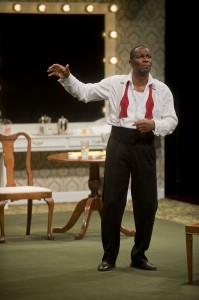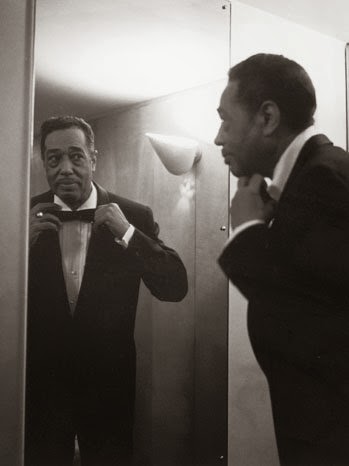•  I rejoice to report the latest news about Satchmo at the Waldorf, which is that John Douglas Thompson just won the 2013-14 Outer Critics Circle Outstanding Solo Performance award. That is–if I do say so myself–a well-deserved honor for a great actor.
I rejoice to report the latest news about Satchmo at the Waldorf, which is that John Douglas Thompson just won the 2013-14 Outer Critics Circle Outstanding Solo Performance award. That is–if I do say so myself–a well-deserved honor for a great actor.
• Satchmo, amazingly enough, continues to be reviewed two months into its off-Broadway run. The latest notice, by Elysa Gardner, appeared last Thursday in USA Today, and like most of its predecessors, it’s a gratifyingly good one.
Here are some excerpts:
A “work of fiction, freely based on fact,” Satchmo introduces us to its subject only months before his death. Armstrong has just finished a set at the titular hotel, which has become his home and workplace; and while Thompson is (and looks) more than 20 years younger, the superb actor manages to evoke his physical and emotional weariness.
In the following 90 minutes, Thompson will also fully serve the frustration, humor and fundamental decency that come through in Teachout’s portrait of Armstrong– and, under veteran director Gordon Edelstein’s robust guidance, convey Glaser’s very different but not entirely unsympathetic nature.
First-time playwright Teachout, a veteran journalist and author, knows his stuff–his credits include the biography Pops: A Life of Louis Armstrong–but spins his fact-based story with both passion and an endearing sense of whimsy.
Of course, he and Edelstein are fortunate to have Thompson. Though it would be impossible for any mere mortal to fully capture the spirit and soul of Armstrong’s music, it would be hard to imagine another trouper better equipped to give us at least a glimpse of the humanity behind it….
Read the whole thing here.
•  Even more amazingly, Duke: A Life of Duke Ellington is also still being reviewed. The Times Literary Supplement, for instance, just published a lengthy review by John Mole of the British edition. It’s not available on line, alas, but a friend sent me some excerpts:
Even more amazingly, Duke: A Life of Duke Ellington is also still being reviewed. The Times Literary Supplement, for instance, just published a lengthy review by John Mole of the British edition. It’s not available on line, alas, but a friend sent me some excerpts:
A photograph, taken in London two years after Duke Ellington’s celebrated “rebirth” at the 1956 Newport Jazz Festival, provides a telling frontispiece to this excellent, revelatory and, with eighty-one pages of source notes, copiously documented book. It shows the Duke regarding himself in a full-length dressing room mirror, adjusting his bow tie and–ever the model of sartorial theatricality–preparing to go out on stage to practise his familiar wry flattery, telling us that we are very beautiful, very sweet, very generous, very gracious and that he and all the kids in the band want us to know that they love us madly. On tour, he will open the show with Billy Strayhorn’s “Take the ‘A’ Train” or his own “Rockin’ in Rhythm,” introduce new work, featuring his star soloists, and reprise his greatest hits in what Terry Teachout refers to more than once as “the dreaded medley,” punctuated by the applause of recognition. This will be both the measure and the price of his achievement as composer and band leader. As Teachout forensically demonstrates, behind the smooth public face lay a complex, evasive personality…
As a drama critic for the Wall Street Journal, a playwright, an accomplished jazz bass player and a biographer of Louis Armstrong, Teachout is well placed to examine with equal authority Ellington’s methods of composition and the individual contributions of many other great musicians who brought out the unique tone colour of his orchestration. Teachout integrates his analysis with a vivid exploration of character….
Teachout gives full attention to the range of Ellington’s ambition and achievement, and the trajectory of his career….
The final chapter, which describes Ellington’s seventieth birthday celebrations at the White House and his refusal to let up on touring, as well as his loneliness and decline, is a particularly moving last act, reminding us, as so often in this book, of Terry Teachout’s ability to bring his experience of theatre to bear on the story he tells.
I especially like that last paragraph.
